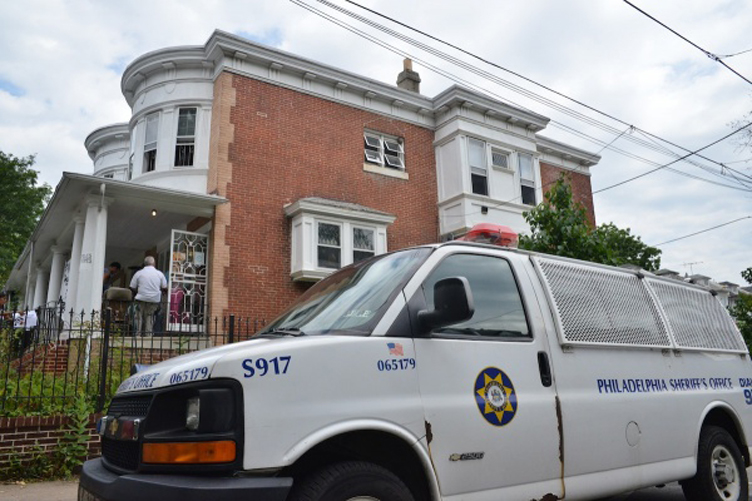North Philly couple suing landlord’s lawyer over right to evict

In 2013, Gerrell Martin and Curtis Sampson rented a property in North Philadelphia for their large family. They are low-income and have six children. Their two-year-old child suffers from cerebral palsy. But within four months of the family moving in, the Department of Licenses and Inspections issued seven violations to the property owner.
That was just the beginning. Five separate sets of violations were issued in the next three years, according to a complaint filed in federal court yesterday, culminating in an October 2016 finding that the building was “unfit for human occupancy.”
In September 2016, the couple began withholding rent to pressure the landlord into making the necessary fixes, including replacing the heating system, which hadn’t been operable since February.
Instead of fixing the heating and the other issues with the house, the couple’s landlord tried to evict them in November 2016.
Unlike most of Philadelphia’s low-income tenants threatened with eviction, Martin and Sampson were able to obtain a lawyer. They took their case to the Philadelphia Fair Housing Commission, won there, and stayed in their home.
That’s unusual. About 92 percent of the tenants who end up in landlord-tenant court lack legal representation. What’s even more unusual is what they did after they won the case: Yesterday they filed a federal lawsuit against their landlord’s lawyer, Bart Levy.
The couple is seeking damages and a trial by jury.
The suit argues that their landlord never provided them with a rental certificate and went for much of their tenure in the property without a rental license. Because the landlord ignored these requirements of the Philadelphia code, the company did not have the right to sue for back rent or threaten the family with eviction.
Martin and Sampson argue that Levy violated the federal Fair Debt Collection Practices Act because the eviction case he filed misstated the condition of the property and ignored the fact that his client wasn’t legally permitted to file for eviction.
Martin and Sampson’s lawyer, Dan Urevick-Ackelsberg of the Public Interest Law Center, says that many landlords are not in compliance with the city’s rental laws and don’t have the right to file evictions. But because so few tenants have lawyers, the renters often don’t know their rights. As a result, they often end up on the street.
“The goal of the case is to give meaning to the laws and regulations that exist,” says Urevick-Ackelsberg. “This is not an issue of one lawyer. This is an issue of norms. In landlord-tenant court the norm is file first and ask questions later. But it should be that if a landlord doesn’t have a legal right to evict a tenant they shouldn’t file a case.”
It should be simple, he claims. If a landlord isn’t legally allowed to collect rent, there’s been no violation of the lease and there is no right to file an eviction suit.
From Levy’s perspective, Wednesday’s suit is a complete surprise: “I don’t know what to make of it, I really don’t,” he says.
Levy notes that lack of a rental suitability certificate is a bar to collecting rent but he claims it isn’t “a threshold issue”–meaning he thinks it isn’t required to file a lawsuit. That’s why he doesn’t ask for it in advance of filing suit.
Levy also says he sent out a disclaimer with the suit saying that if the rent demand isn’t just, his client would call it off. And that’s what he did when he realized his client didn’t have a right to the money after the Fair Housing Commission ruled against them. (The commission ruled against Levy’s client on January 5. Despite that ruling, the separate eviction suit wasn’t withdrawn until March 2.)
“Now for fun, or profit, or I guess just building a reputation, I am being set upon,” says Levy. (Until Wednesday he’d never even heard of the Public Interest Law Center.) “And that’s how things are done in this country. I don’t know what to make of it.”
Urevick-Ackelsberg says the suit could have been filed against any number of the law firms that regularly file eviction cases in landlord-tenant court. Asked to say more about Levy, he demurs, saying it isn’t about attacking or putting anyone in particular out of business.
“All it’s seeking to do is have lawyers verify that the money they are demanding from largely low income renters is in fact due,” says Urevick-Ackelsberg. His hope is “that lawyers will tell their landlord clients that they can’t file an eviction unless the landlord does what the law says they have to do.”
The case comes at a moment when Philadelphia’s landlord tenant court is receiving scrutiny from housing advocates and from the City Council. On Monday afternoon (March 20), a City Council hearing will be held on the subject of housing conditions in the city, the state of eviction court, and the prospect of a right to counsel for tenants who cannot afford their own lawyers.
WHYY is your source for fact-based, in-depth journalism and information. As a nonprofit organization, we rely on financial support from readers like you. Please give today.







